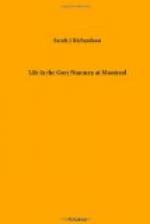Another proof of the persecuting spirit of Rome is furnished by the “Narrative of Raffaele Ciocci, formerly a Benedictine Monk, but who now ’comes forth from Inquisitorial search and torture, and tells us what he has seen, heard and felt.’” We can make but a few extracts from this interesting little volume, published by the American and Foreign Christian Union, who,—to use their own language—“send it forth as a voice of instruction and warning to the American people. Let the facts be heard and read. They are not to be set aside by an apology for the dark ages, nor an appeal to the refinement of the nineteenth century. Here is Rome, not as she was in the midnight of the world, but as she is at the present moment. There is the same opposition to private judgment —the same coercive measures—the same cruel persecution— the same efforts to crush the civil and religious liberties of her own subjects, for which she has ever been characterized.”
Ciocci, compelled at an early age to enter the Catholic College—forced, notwithstanding his deep disgust and earnest remonstrance, to become a monk—imprisoned— deceived—the victim of priestly artifice and fraud, at length becomes a Christian. He is of course thrown into a deeper dungeon; and more exquisite anguish inflicted upon him that he may be constrained to return to the Romish faith. Of his imprisonment he says, “We traversed long corridors till we arrived at the door of an apartment which they requested me to enter, and they themselves retired. On opening the door I found myself in a close dark room, barely large enough for the little furniture it contained, which consisted of a small hard bed, hard as the conscience of an inquisitor, a little table cut all over, and a dirty ill-used chair. The window which was shut and barred with iron resisted all my efforts to open it My heart sunk within me, and I began to cogitate on the destiny in store for me.” The Jesuit Giuliani entering his room, he asked that the window might be opened for the admission of light and air. Before the words were finished he exclaimed in a voice of thunder, “How! wretched youth, thou complainest of the dark, whilst thou art living in the clouds of error? Dost thou desire the light of heaven, while thou rejectest the light of the Catholic faith?”
Ciocci saw that remonstrance was useless, but he reminded his jailer that he had been sent there for three days, to receive instruction, not to be treated as a criminal.
“For three days,” he resumed, counterfeiting my tone of voice, “for three days! That would be nothing. The dainty youth will not forsooth, be roughly treated; it remains to be seen whether he desires to be courteously entertained. Be converted, be converted, condemned soul! Fortunate is it for thee that thou art come to this place. Thou wilt never quit it excepting with the real fruits of repentance! Among these silent shades canst thou meditate at thy leisure upon the




